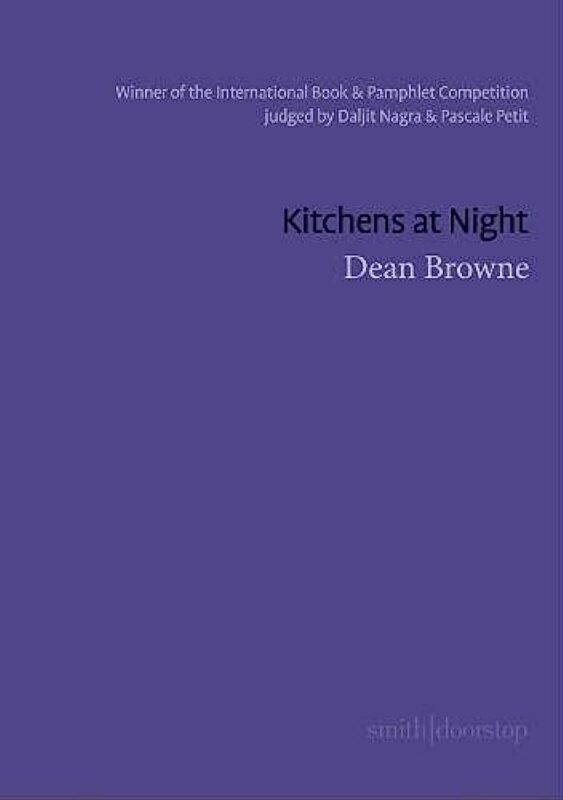REVIEW: DEAN BROWNE’S ‘KITCHENS AT NIGHT’
By Stella Backhouse

What does the unconscious feel like? Notice, I’m not asking what it looks like. That’s not because we know what it looks like – probably it doesn’t ‘look like’ anything in the conventional sense. But thanks to Surrealist artists such as Dalí and Magritte (who were in turn inspired by the pioneers of psychoanalysis, especially their work on dreams), we can read artistic signifiers that alert us to it. Dean Browne’s 2022 pamphlet Kitchens at Night ripples with nods to these signifiers. Browne asks not only how it feels to be in possession of something that is difficult to access but is still an intrinsic part of the psyche, but also how you conceptualise your relationship with such an entity and your relationship with artistic representations of it that have been tried already.
The text of ‘Aide-mémoire’, the first poem, concerns a man who is followed by a goat that wears around its neck a sign bearing the gnomic instruction to ‘NEVER FORGET’. What the man is supposed to never forget is a puzzle even he can’t solve, but in the meantime, his attitude towards the goat is one of tolerance rather than hostility: “Nobody appears to notice what is following me. I…try to decide where, if anywhere, all this might connect./Goat stands by the door, NEVER FORGET dripping into the tiles”.
Persistent but separate, it’s hard to know what the goat represents. Guilt? Browsing history? Artistic endeavour? But deploying the language of Surrealism, there’s a clue in the poem’s title, which recalls Salvador Dalí’s ‘The Persistence of Memory’ and together with the last poem, ‘Self-Checkout’, brackets the book in motifs associated with Surrealist painter Réné Magritte. In ‘Self-Checkout’ it’s an apple; in ‘Aide-mémoire’ it’s a previously unmentioned ear popping up in the last line, casually disembodied from the corpus of the poem: “I mash my cigarette,/touch my ear, and it comes off”.
Whether the poems are written from the point of view of the conscious or unconscious mind remains unclear, but the theme of something that could yield answers if only it could be comprehended is developed further in ‘Memory is a Wardrobe’. Here, the idea of a separate or secret space is introduced, something that once opened and entered, will unite the poet with what was previously outside him. In ‘Pine Box in the Flea Market’, he intuits that “opening it will be intimate, you think –/like the sudden glimpse of a heel/when she nips to the bath”.
Existentialism is also detectable, for example in the numerous ‘which-came-first’ inclusions of eggs and poultry. The line “‘what business has live poultry doing here’” in ‘Eclectus’ also made me wonder if ‘poultry’ was a private-joke/Freudian slip word for ‘poetry’. Later in the poem, the poet visits ‘the father’, with whom recent communication has been sparse. When the bird-keeper father makes a gesture of reconciliation by selecting a parrot that “shuffles onto his open palms, enters/mine, to my surprise and its”, are witnessing, perhaps, a delicate imagining of how poetic inspiration is handed from the unconscious to the conscious mind.
If my description so far makes Browne sound schematic, don’t worry. Instead, why not step back from the theory and enjoy these poems as a celebration of the strangeness of ordinary, a fantasia on how, even in the midst of banal necessities such as food preparation, our thoughts escape control and wander off in multiple inexplicable directions. Browne is playful with both ideas (“I should never have written the instruction manual/illustrating the 52 distinct tones that can be struck/from the triangle”) and language (“Every job/I’ve known has been take the shift/or get the shaft. I’m learning to shirk”).
Several parallel universes exist within each of these poems. But there is evolution. While the second poem, ‘Curriculum Vitae’, seems to be about fighting to stop the unconscious and its irrelevancies invading the focus needed in employment (“I stand around incongruous as party glitter on a coffin lid/with my inevitable questions: mustard, or ketchup?”), ‘Self-Checkout’ has arrived at accommodation via a kitchen table. Resting his elbows on its grain, Browne stops trying to analyse the exact locus of its table-y essence and simply listens: “I was once a seed/so minute you could swallow me/whole and not notice./Lean on me, be nourished”.
Kitchens at Night is available to purchase online, direct from publisher The Poetry Business, as well as other bookshops and retailers.
